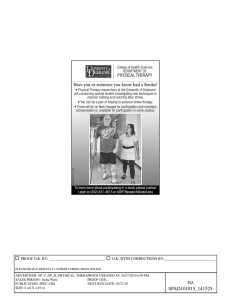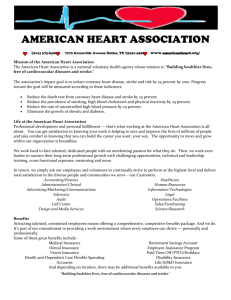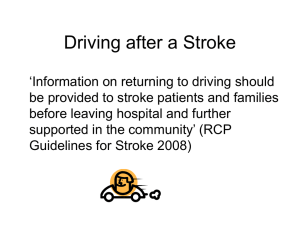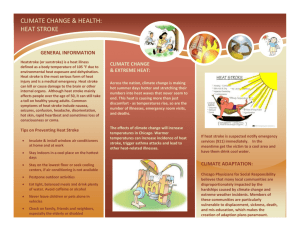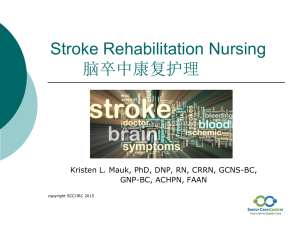Speech Therapy After Stroke: Aphasia & Swallowing Help
advertisement
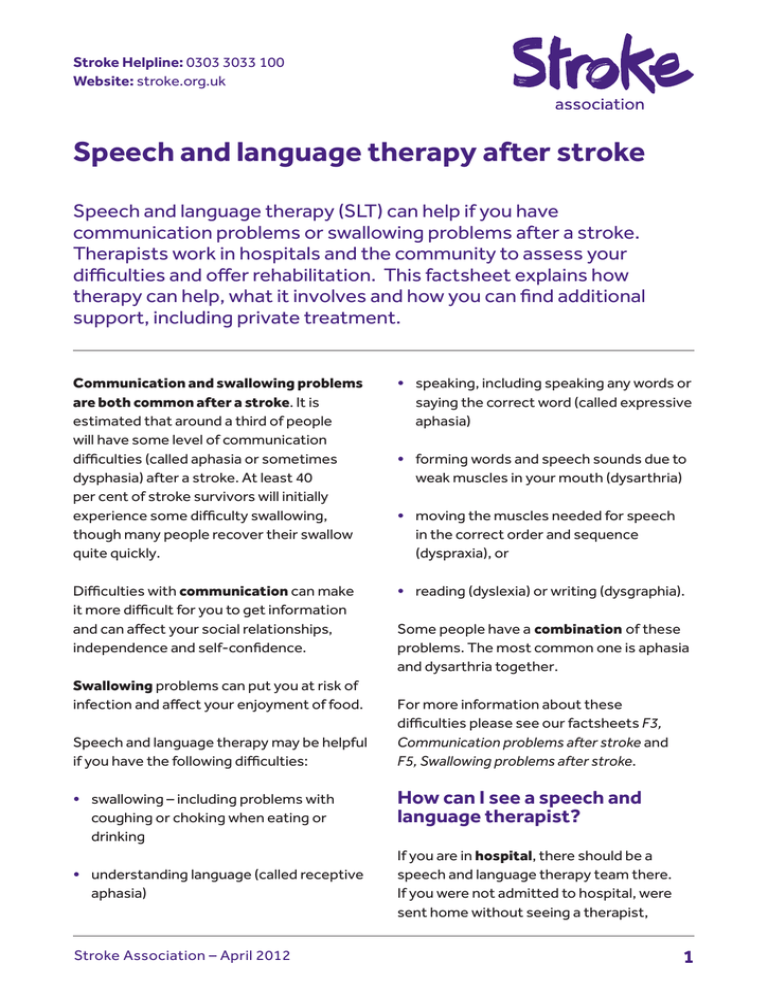
Stroke Helpline: 0303 3033 100 Website: stroke.org.uk Speech and language therapy after stroke Speech and language therapy (SLT) can help if you have communication problems or swallowing problems after a stroke. Therapists work in hospitals and the community to assess your difficulties and offer rehabilitation. This factsheet explains how therapy can help, what it involves and how you can find additional support, including private treatment. Communication and swallowing problems are both common after a stroke. It is estimated that around a third of people will have some level of communication difficulties (called aphasia or sometimes dysphasia) after a stroke. At least 40 per cent of stroke survivors will initially experience some difficulty swallowing, though many people recover their swallow quite quickly. •• speaking, including speaking any words or saying the correct word (called expressive aphasia) Difficulties with communication can make it more difficult for you to get information and can affect your social relationships, independence and self-confidence. •• reading (dyslexia) or writing (dysgraphia). Swallowing problems can put you at risk of infection and affect your enjoyment of food. Speech and language therapy may be helpful if you have the following difficulties: •• swallowing – including problems with coughing or choking when eating or drinking •• understanding language (called receptive aphasia) Stroke Association – April 2012 •• forming words and speech sounds due to weak muscles in your mouth (dysarthria) •• moving the muscles needed for speech in the correct order and sequence (dyspraxia), or Some people have a combination of these problems. The most common one is aphasia and dysarthria together. For more information about these difficulties please see our factsheets F3, Communication problems after stroke and F5, Swallowing problems after stroke. How can I see a speech and language therapist? If you are in hospital, there should be a speech and language therapy team there. If you were not admitted to hospital, were sent home without seeing a therapist, 1 Speech and language therapy after stroke or need further therapy when you have left hospital then your GP can refer you to a community speech and language therapist. You or your family or carer can also contact your local speech and language therapy department directly. In these situations the first assessment usually takes place at your home or at an outpatient department of the local hospital. Sometimes a therapist or assistant may telephone you or a family member for further information before your first appointment is made. What does therapy involve? Speech and language therapists assess people with communication difficulties and help people to overcome and/or adapt to a range of communication problems. They also assess people who have swallowing problems and advise on safe ways to eat and drink. Your therapist’s aim will be to work with you and your family and carer. Therapy can minimise the impact of your difficulties and improve your wellbeing. Swallowing You should ideally have a specialist assessment of your swallowing within 24 hours of going into hospital. There are different swallow tests, for example one involves watching you swallowing 50 ml of water. Swallowing assessments may also be done by another trained professional, such as a nurse. You may have a test called a videofluoroscopy. This involves making an x-ray video where you swallow a solution that will 2 show up on the x-ray. This will show your speech and language therapist exactly how your swallowing has been affected by your stroke. If you have problems swallowing your normal diet, your speech and language therapist may assess you with foods that taste different or are a different temperature, or with a fizzy drink. Your therapist should design and monitor a swallowing rehabilitation programme for you. This should include compensatory strategies such as changing your posture (e.g. tucking your chin in) or different swallowing manoeuvres and techniques to improve your swallowing, such as headlifting exercises. They can also give you advice on what foods are easier to swallow, what to avoid and what to do if you choke. Your carer, if you have one, should also be trained to recognise and manage your swallowing difficulties. Communication The aim of therapy is to help you to recover as much of your speech as possible and/or find alternative ways of communicating. Your personal goals will probably be different depending on factors like your age and whether or not you are working. You are the expert in how your aphasia has affected you, and your therapist should involve you and your family in decisions about your treatment and goals. Initially, the speech and language therapist will make an informal assessment of your general ability to communicate – for example, how well you understand what is said to you, how difficult it is for you to express yourself and your general wellbeing. Stroke Association – April 2012 Speech and language therapy after stroke This should be followed by a formal assessment. This may pick up problems which are not clear from talking to you. It will help your therapist to establish a baseline to measure change against, and to design an individual programme of therapy. Your assessment should take into account your understanding of yes/no questions. For example, you might be asked questions like ‘do you put your shoes on before your socks?’ You may be asked to describe your surroundings as a test of your spontaneous speech or asked to repeat simple phrases or sounds. It is important that your assessment also takes into account factors unrelated to your stroke which can affect your communication such as previous problems with your vision or hearing, poorly fitting dentures or background distractions. A stroke may also cause new problems, including loss of vision or memory, that can make communication more difficult. There is some overlap between the tasks you will be asked to do for assessment and therapy and your therapist should keep checking your progress as you work together. The techniques your speech and language therapist uses to help with your communication difficulties will depend on the particular problems you have. Therapies that target the specific area of communication you find difficult are most effective. For example, if you have difficulty understanding the meanings of words (receptive aphasia) you may be asked Stroke Association – April 2012 to match words to pictures, sort words according to their meaning and judge whether words have the same meaning. These activities aim to strengthen your ability to remember word meanings and link them to the spoken and written forms of words. If you have difficulty finding the words you want to say (expressive aphasia) your therapy might include practising naming pictures, judging whether words rhyme or not or repeating words your therapist says. Your therapist may provide prompts, for example, making the first sound of a word or writing the first letter for you. They may also show you objects that you can touch and see whilst speaking their names. If you have weak muscles in your mouth, you may initially need to do exercises to help improve your muscle strength. Your speech and language therapist may also give you advice on body positioning and where your tongue, lips and jaw should go when producing particular sounds. Difficulty controlling your breathing muscles can force you to take a breath in the middle of a sentence. Your speech and language therapist may teach you breathing exercises and how to plan pauses within sentences to help with this. One approach to helping dyspraxia is to use natural melodic patterns for everyday phrases. For example, the phrase ‘Good morning!’, when said very cheerfully, has an almost musical melody. Your therapist can teach you to use this in an exaggerated way to co-ordinate your speech. As your speech improves, the melody and rhythm cues can be gradually dropped. 3 Speech and language therapy after stroke If you have difficulty making the right sounds in the right order to form words, your therapy should include tasks such as listening to differences between spoken words, repeating words of increasing length and developing the ability to monitor your speech. Some people who can do tasks involving single words, such as naming pictures, have difficulty constructing sentences. Your therapy should also work on your ability to understand and produce simple and complicated sentences. An important part of the speech and language therapist’s role involves finding alternative or additional ways of communicating, which may include: •• •• •• •• •• gestures writing communication charts a letter board, or drawing. For some people an electronic communication aid may be beneficial. Again, your speech and language therapist can advise on what would be helpful. (See our resource sheet R5, Electronic communication aids and software for more information.) Speech and language therapists are masters of non-verbal communication. They can give advice to family members on adapting communication to make it easier to understand. Because communication problems are often extremely difficult for stroke survivors to come to terms with, many speech and language therapists also take on a counselling role. 4 Reading and writing If you have problems with speech, it is quite likely that you will have problems with writing (dysgraphia), spelling and reading (dyslexia). The areas of the brain which are important for these tasks are quite close together. Therapy which helps with speech may also help with reading and writing. This is because all ways of communicating use similar abilities; for example, finding the right words and constructing them into a sentence. However, if you have difficulty with one particular way of communicating, your therapy should focus on this. How can my family help? When therapy starts, the therapist will usually give written instructions so that you and your family can practise specific exercises between sessions. It may be helpful if a family member can attend some therapy sessions to observe the exercises, and help you to practise them. Communication problems can be frustrating and lonely for family and carers as well as for a person who has these difficulties. Your family should try to resist the temptation to do all the talking for you. Many people who have had a stroke are capable of understanding and producing speech but their speech may be slow at first. It is easy to overwhelm someone by asking more questions before they have had a chance to process the first one. For some people it can help to wait as long as half a minute. To begin with, family members can try asking questions that only need a ‘yes’ or ‘no’ answer. Later, they can increase the complexity, just like learning a foreign language. Repetition and hard work are important. Stroke Association – April 2012 Speech and language therapy after stroke Communication can be very tiring. It can sometimes help to take the pressure off you and your family and just enjoy each other’s company. You could try activities that don’t need much communication, such as listening to music together or looking through photo albums. Questions to ask your speech and language therapist What has your assessment shown? Can you write down the main points so that I can look at them later? What will therapy involve? Are there any other therapies which might work? How can my family be involved in my therapy? with aphasia benefit from speech and language therapy. The more intensive this is the better the outcomes tend to be. As a minimum, two hours per week for six months seems to make a significant impact. The amount of therapy will depend on the extent of your difficulties and how well you are able to concentrate. Early on, frequent short sessions are best, because you are likely to feel tired after just a few minutes. Later, your concentration should improve. Your therapist should discuss any changes in the therapy with you and your family before they happen. Many people are concerned when therapy ends, especially if they feel they have not made as full a recovery as they hoped. It is worth asking the therapist why your therapy is ending, and what you can do to continue to improve your skills and confidence. Practising the exercises from the therapy sessions at home can still help to improve communication. How long will therapy go on for? How will we decide when to stop? Is there anywhere I can go for more help once my therapy stops? How much therapy should I have? Speech and language therapy should start as soon as possible after your stroke, once you are well enough. Anyone with aphasia lasting more than two weeks should be considered for intensive treatment (two - eight hours per week). Overall, there is good evidence that people Stroke Association – April 2012 The therapist may set a date for a followup review, usually within six months of therapy ending. If this does not happen you may request a follow-up appointment. If new problems arise or old ones resurface, it may be helpful to enquire about another assessment and the possibility of further therapy. This may take place in a group setting or one to one. Your GP can refer you back to see a therapist, or you may be able to refer yourself. Can I have private therapy? You can access private therapy after an NHS course has finished, or whilst you are still having therapy on the NHS. You are entitled to seek independent therapy and your NHS 5 Speech and language therapy after stroke therapy cannot be stopped because you are also seeing a private therapist. It is helpful to make both therapists aware of each other so they can ensure your therapy is consistent. Your therapists may share information about your treatment if you give permission. This will make sure that both therapists are working towards the same goals. However, if you want a confidential second opinion this should be respected. Before deciding on a private therapist, make sure that he or she has experience of stroke rehabilitation and that you understand what the fees will be, how many sessions are likely to be involved and where the therapy will take place. All practising speech and language therapists must be registered with the Health Professions Council (HPC). This ensures they have recognised and continuing training. For organisations that can put you in touch with a private therapist, please see the end of this factsheet. 6 Stroke Association – April 2012 Speech and language therapy after stroke Useful organisations All organisations are UK wide unless otherwise stated. Stroke Association Stroke Helpline: 0303 3033 100 Website: stroke.org.uk Email: info@stroke.org.uk Contact us for information about stroke, emotional support and details of local services and support groups. Resources from the Stroke Association •• In some areas we have Communication Support Services. Our communication support staff and trained volunteers offer group or one-to-one sessions for people with aphasia to help them improve their communication skills. •• Stroke clubs are informal support groups for people affected by stroke. Clubs can be a good place to practise your communication around people who will understand your difficulties. Some clubs have therapy available during their meetings. •• Our ‘Communication card’ is credit card sized and states “I have had a stroke and find it difficult to speak, read or write, please give me time to communicate”. It also has room for your name, address and emergency contact details. Royal College of Speech and Language Therapists Tel: 020 7378 1200 Email: info@rcslt.org Website: www.rcslt.org The professional body for speech and language therapists in the UK. Sets professional standards, promotes research and training and provides information. Association of Speech and Language Therapists in Independent Practice Tel: 01494 488306 Website: www.helpwithtalking.com Has a nationwide database of private therapists throughout the UK which you can search on their website. Also has a list of useful resources, and materials and therapeutic ideas for people with aphasia. Health Professions Council Tel: 020 7582 0866 Website: www.hpc-uk.org Keeps a register of health professionals who meet their standards for their training, professional skills, behaviour and health. Disclaimer: The Stroke Association provides details of other organisations for information only. Inclusion in this factsheet does not constitute a recommendation or endorsement. •• Our ‘Communication chart’ - an aid to communication consisting of the alphabet, numbers, a clock and pictures for common words, for example, ‘hungry’, ‘hot’ and ‘cold’ (Price £1). Stroke Association – April 2012 7 Speech and language therapy after stroke Produced by the Stroke Association’s Information Service. For sources used, visit stroke.org.uk © Stroke Association Factsheet 14, version 01 (published April 2012, next review due December 2013). Item code: A01F14 The Stroke Association is a charity. We rely on your support. Text STROKE 5 to 70300 to donate £5. 100% of your donation goes to the Stroke Association. Find out how your support helps at stroke.org.uk/savelives The Stroke Association is a company limited by guarantee, registered in England and Wales (No 61274). Registered office: Stroke Association House, 240 City Road, London EC1V 2PR. Registered as a charity in England and Wales (No 211015) and in Scotland (SC037789). Also registered in Northern Ireland (XT33805), Isle of Man (No 945) and Jersey (NPO 369). Stroke Association – April 2012 8
